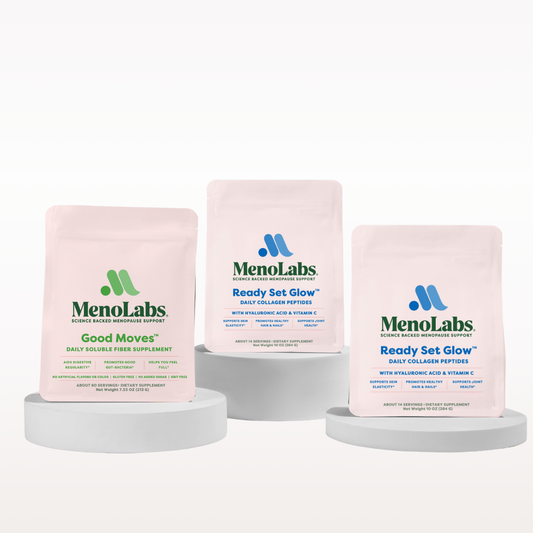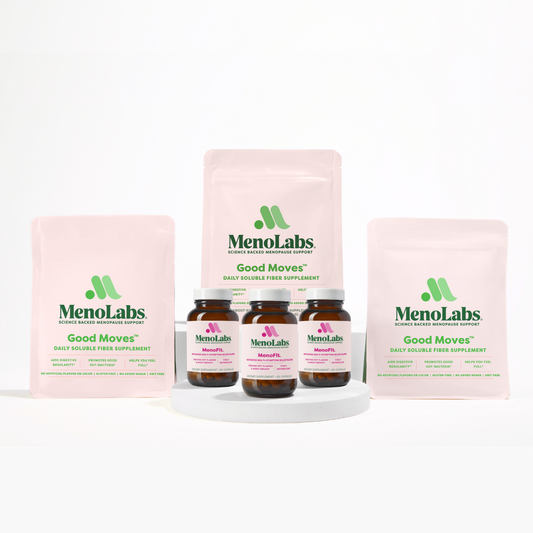Even if we take steps to try to mitigate our menopausal symptoms, having a flare-up isn’t unusual or abnormal. Many things influence our menopausal symptoms and our bodies undergo so many different changes that it can become a struggle to manage them. According to our menopause expert Maggie Ney, ND*, the key is taking note of when you experience symptoms and what extenuating circumstances might be influencing them: “Tracking our symptoms and the potential triggers to these symptoms can be an empowering process so we can make the best lifestyle choices for ourselves.”
1. Hormone Fluctuations
The endocrine system is responsible for signaling the body when to perform certain functions based on information sent from hormones. Hormones, especially the sex hormone estrogen, fluctuate during perimenopause and the menopause transition. When estrogen levels fluctuate, the body generates a response in the form of a menopausal symptom, such as hot flashes. Generally, after menopause, hormones remain low and stable. But certain medical issues, lifestyle habits, and environmental conditions can lead to hormonal imbalances that trigger symptoms.
2. External Triggers
It’s important to identify and avoid external symptom triggers. If these triggers don’t directly cause menopausal symptoms, they may at least contribute to the return of menopausal symptoms when combined with naturally occurring hormonal fluctuations. Cutting out these triggers and then returning to them later can also cause certain menopausal symptoms to resurface.
External symptom triggers to consider include:
- Alcohol
- Spicy foods
- Strenuous exercise
- Hot and/or humid weather
- Smoking
- Heat-based hair styling tools
- Excessive hot beverage consumption
- Heavy clothing, especially those made with synthetic fibers
3. Dehydration and Stress
Dehydration and stress are the most commonly reported problems among women going through menopause. Stress and dehydration, though simple and obvious causes, can sometimes be more difficult to recognize and fix.
As women go through the menopausal transition, the increase in hot flashes, night sweats, and even increases in daily exercise can cause the body to become easily dehydrated. This can feed into the frequent return of certain menopausal symptoms, especially hot flashes as dehydration increases core body temperature. Being dehydrated can be a stressor to the nervous system. The body’s stress response causes the release of hormones that cause our heart to beat faster and blood vessels to constrict, raising your core body temperature and sending signals to your brain to trigger a hot flash.
High-stress levels can impact almost every system in the body. Most importantly, stress harms the immune system. And as your immune system’s ability to produce and release cells that help fight off illnesses from bacteria and viruses, your body becomes overworked and less able to regulate body temperature, mood swings, concentration, and sleep cycles efficiently. Finding ways to manage and lower stress is paramount to helping lower your menopausal symptoms and preventing them from resurfacing frequently.
4. Interconnected Symptoms
In certain cases, the menopause symptoms you’re experiencing are actually the result of another symptom. The most prevalent example of this is a yeast infection. As estrogen levels decline it can lead to vaginal dryness. This can change the pH of our vagina making women more susceptible to vaginal infection and urinary tract infections. The change in our vaginal pH can also cause a disruption in our vaginal microbiome further increasing our susceptibilities to infections, like yeast infections.
If you experience yeast infections often, you should speak to your doctor about treatment and preventative methods that may help lower your risk of developing more in the future. Avoiding foods with refined sugars also helps to lower your chances of developing a yeast infection as sugar is ambrosia for vaginal yeast.
Staying Proactive Is Key
Being proactive about your menopausal health is the key to managing your symptoms. Stick to routines and feed your body what it needs, both from food sources and from exercise and other important habits. Consistency is key to helping your hormonal fluctuations smooth out and staying on track with your menopausal health.
*The information found in this blog shall not be considered medical advice and is being provided for information purposes only. It is not intended to substitute professional medical advice, diagnosis, or treatment. Please consult with your healthcare provider should you have any questions or concerns.
Related Products
Blend Besties Bundle
Fresh Start Bundle
4.7 / 5.0
(554) 554 total reviews












